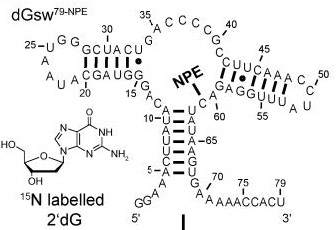News Archive
New synthesis approach allows modification of long RNAs in a position-specific manner for biophysical studies
July 2018. RNAs are well known for their role in the translation of the hereditary information encoded in our genes. Over the last decade scientists have come to realize that RNAs have in addition many other important functions. The study of structure-function relationships of non-coding RNAs has been challenging however and they remain unexplored for many RNAs. A new method developed by chemists at Goethe University Frankfurt will aid biophysical studies of RNA function such as studies using light control or NMR spectroscopy.
The investigation of non‐coding RNAs requires synthesizing RNAs that contain modifications at different positions within the oligonucleotide molecule. Solid-phase synthesis, the method used most widely for the synthesis of modified oligonucleotides, is not well suited for the preparation of longer RNAs of high purity. And targeting the incorporation of modified nucleotides to specific single positions is difficult with enzymatic synthesis. The Frankfurt team noew presents a novel chemo‐enzymatic RNA synthesis approach that allows incorporation of a wide range of modifications at any desired position in RNAs of any lengths.
 Photoremovable protecting groups or photoswitches attached to RNAs are extremely useful for structural and functional studies because light as the trigger signal can be applied under high spatiotemporal control. Introduction of photocages by solid-phase synthesis is however cost- and time-consuming. Introduction of photocages into RNA after synthesis using convertible nucleosides is limited to primary amines. By combining enzymatic reactions with three different enzymes (T4 RNA ligase 1, shrimp alkaline phosphatase and T4 RNA ligase 2) the new method allows the introduction of photoactivatable groups or 13C,15N-enriched nucleotides at any specific position of a large RNA at high yields. More ...
Photoremovable protecting groups or photoswitches attached to RNAs are extremely useful for structural and functional studies because light as the trigger signal can be applied under high spatiotemporal control. Introduction of photocages by solid-phase synthesis is however cost- and time-consuming. Introduction of photocages into RNA after synthesis using convertible nucleosides is limited to primary amines. By combining enzymatic reactions with three different enzymes (T4 RNA ligase 1, shrimp alkaline phosphatase and T4 RNA ligase 2) the new method allows the introduction of photoactivatable groups or 13C,15N-enriched nucleotides at any specific position of a large RNA at high yields. More ...
Contacts:
Harald Schwalbe (schwalbe@nmr.uni-frankfurt.de) and Alexander Heckel (heckel@uni-frankfurt.de), Institute for Organic Chemistry and Chemical Biology, Riedberg Campus, Goethe University Frankfurt, Frankfurt/Main, Germany
Publication:
Sara Keyhani+, Thomas Goldau+, Anja Blümler, Alexander Heckel*, Harald Schwalbe* (2018) Chemo-enzymatic synthesis of position-specifically modified RNA for biophysical studies including light control and NMR spectroscopy. Angewandte Chemie International Edition: published online 14 July 2018. http://dx.doi.org/10.1002/anie.201807125
Cluster of Excellence Macromolecular Complexes, Frankfurt am Main, Germany

